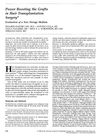
Forensic hair analysis for drugs is now more reliable and accurate.
 September 2020 in “Journal of Investigative Medicine”
September 2020 in “Journal of Investigative Medicine” Omics techniques are needed to understand the scalp microbiome's role in alopecia areata for new treatments.
 19 citations,
January 2008 in “The veterinary clinics of North America. Exotic animal practice”
19 citations,
January 2008 in “The veterinary clinics of North America. Exotic animal practice” Adrenal gland disease is common in ferrets and causes hair loss and other symptoms.
 391 citations,
January 2010 in “Journal of The American Academy of Dermatology”
391 citations,
January 2010 in “Journal of The American Academy of Dermatology” Half of people with Alopecia Areata may see hair regrowth within a year without treatment, but recovery is unpredictable.
 4 citations,
February 2016 in “Clinical Pharmacology & Therapeutics”
4 citations,
February 2016 in “Clinical Pharmacology & Therapeutics” Hair follicle samples effectively show how well the drug MK-0752 targets and engages with the Notch pathway.

Dermal stem cells help regenerate hair follicles and heal skin wounds.
 15 citations,
April 2003 in “Journal of dermatology”
15 citations,
April 2003 in “Journal of dermatology” Alopecia areata causes hair loss due to an immune attack on hair follicles, influenced by genetics and environment.
 19 citations,
August 2019 in “Expert Opinion on Therapeutic Targets”
19 citations,
August 2019 in “Expert Opinion on Therapeutic Targets” New treatments for hair loss may target specific pathways and generate new hair follicles.
 218 citations,
January 2013 in “The Lancet Oncology”
218 citations,
January 2013 in “The Lancet Oncology” Chemotherapy causes hair loss by damaging hair follicles and stem cells, with more research needed for prevention and treatment.
 20 citations,
May 2020 in “Experimental Dermatology”
20 citations,
May 2020 in “Experimental Dermatology” Aging scalp skin contributes to hair aging and loss, and more research is needed to develop better hair loss treatments.
 4 citations,
August 2018 in “Facial Plastic Surgery Clinics of North America”
4 citations,
August 2018 in “Facial Plastic Surgery Clinics of North America” Platelet-Rich Plasma (PRP), a protein-rich extract from a patient's blood, shows promise in improving hair density, thickness, and quality, but the best method of use and number of treatments needed for noticeable results are still unclear.
 19 citations,
July 2020 in “Journal of drug delivery science and technology”
19 citations,
July 2020 in “Journal of drug delivery science and technology” Nanoemulsions with minoxidil and clove oil effectively target hair follicles for better alopecia treatment.
 January 2003 in “Postgraduate medicine”
January 2003 in “Postgraduate medicine” The article concludes that hair loss has many causes and treatments, with medication options like finasteride and minoxidil for men, and minoxidil, hormones, or iron for women, while warning against unproven remedies.
 31 citations,
April 1999 in “Dermatologic Clinics”
31 citations,
April 1999 in “Dermatologic Clinics” Nd:YAG laser can reduce hair with multiple treatments, but permanent removal isn't guaranteed.
 22 citations,
December 1998 in “Dermatologic Surgery”
22 citations,
December 1998 in “Dermatologic Surgery” A new storage solution may increase hair transplant graft survival.
 January 2017 in “International journal of clinical & experimental dermatology”
January 2017 in “International journal of clinical & experimental dermatology” Eating a balanced diet with vitamins, micronutrients, and antioxidants is important for hair health and can help with hair loss.
 32 citations,
July 2012 in “Stem Cells Translational Medicine”
32 citations,
July 2012 in “Stem Cells Translational Medicine” Vitamin D3 can help improve hair growth by enhancing the function of specific skin cells and could be useful in hair regeneration treatments.
 3 citations,
February 2008 in “Basic and clinical dermatology”
3 citations,
February 2008 in “Basic and clinical dermatology” Telogen Effluvium is a hair loss condition where treatment involves identifying and managing its triggers.
 January 2023 in “Theranostics”
January 2023 in “Theranostics” A patch with curcumin-zinc can improve hair growth and health by delivering beneficial particles to the skin, increasing hair follicles, and reversing effects of a hair loss hormone.
 1 citations,
October 2018 in “InTech eBooks”
1 citations,
October 2018 in “InTech eBooks” The document concludes that treatments for cicatricial alopecia are not well-supported by evidence, but hair transplantation shows more predictable and satisfactory results.
 February 2024 in “Medicina-lithuania”
February 2024 in “Medicina-lithuania” Obesity and bariatric surgery can cause hair thinning and temporary hair loss due to nutritional deficiencies and stress.
286 citations,
August 2007 in “Journal of Clinical Investigation” Alopecia areata is an autoimmune disease where T cells attack hair follicles.
3 citations,
May 2015 in “Journal of archives in military medicine” Platelet-rich plasma (PRP) shows promise in military medicine but its effectiveness varies.
November 2023 in “Applied sciences” Pig blood can be used to mass-produce stable, low-cost platelet dry powder for medical use.
40 citations,
January 2018 in “International journal of trichology” Healthy scalp reduces hair loss by managing oxidative stress.
 24 citations,
May 2018 in “Journal of Molecular Endocrinology”
24 citations,
May 2018 in “Journal of Molecular Endocrinology” The spiny mouse is a unique menstruating rodent that can help us understand menstruation and reproductive disorders.
16 citations,
January 2022 in “International journal of molecular sciences” Certain daily habits like stress, diet, and sleep can affect the severity of hair loss in alopecia areata.
107 citations,
March 2014 in “BoneKEy Reports” Mutations in the vitamin D receptor cause hereditary vitamin D-resistant rickets, leading to poor bone health and requiring high calcium doses for treatment.
 November 2024 in “BMC Surgery”
November 2024 in “BMC Surgery” Follicular unit extraction is an effective and minimally invasive treatment for male hair loss.
 July 2023 in “IntechOpen eBooks”
July 2023 in “IntechOpen eBooks” New treatments for alopecia areata show promise, but more research is needed to confirm their effectiveness.
























